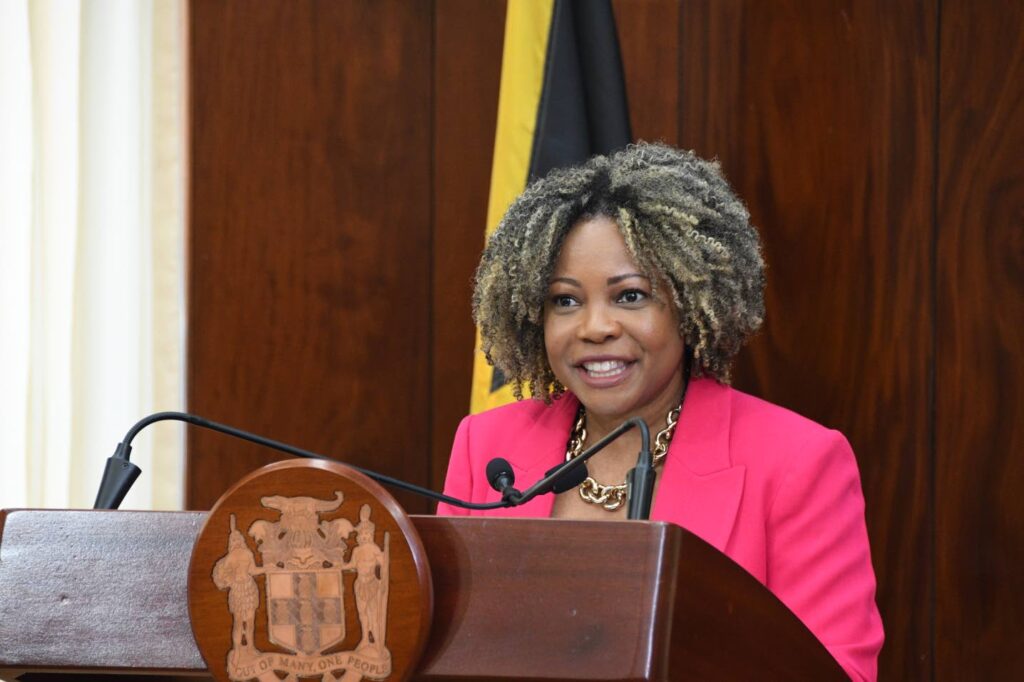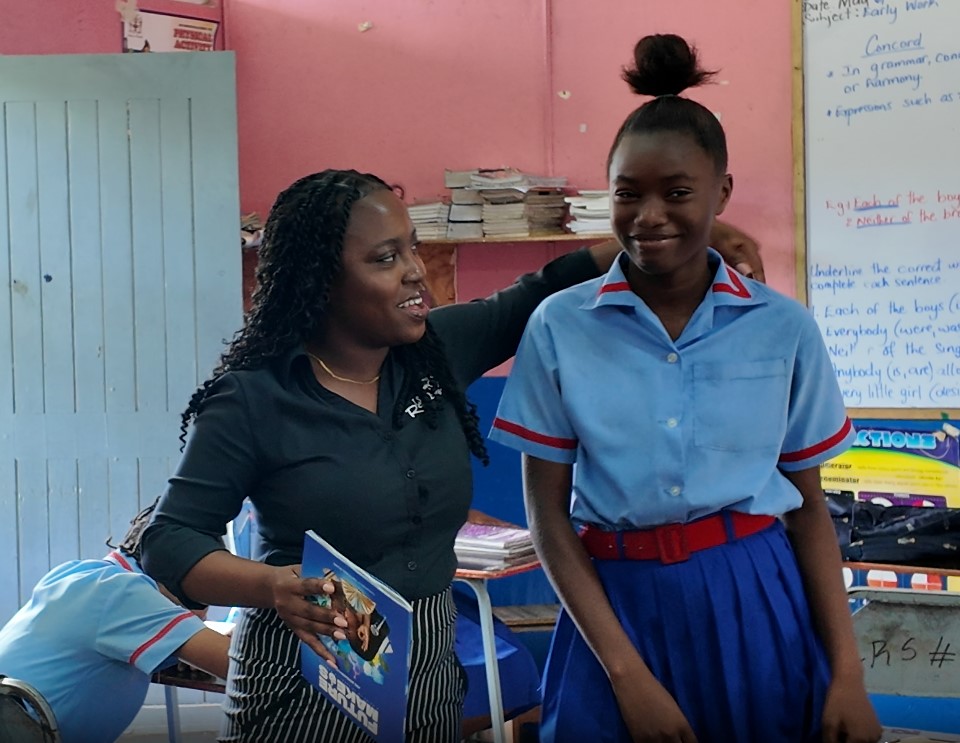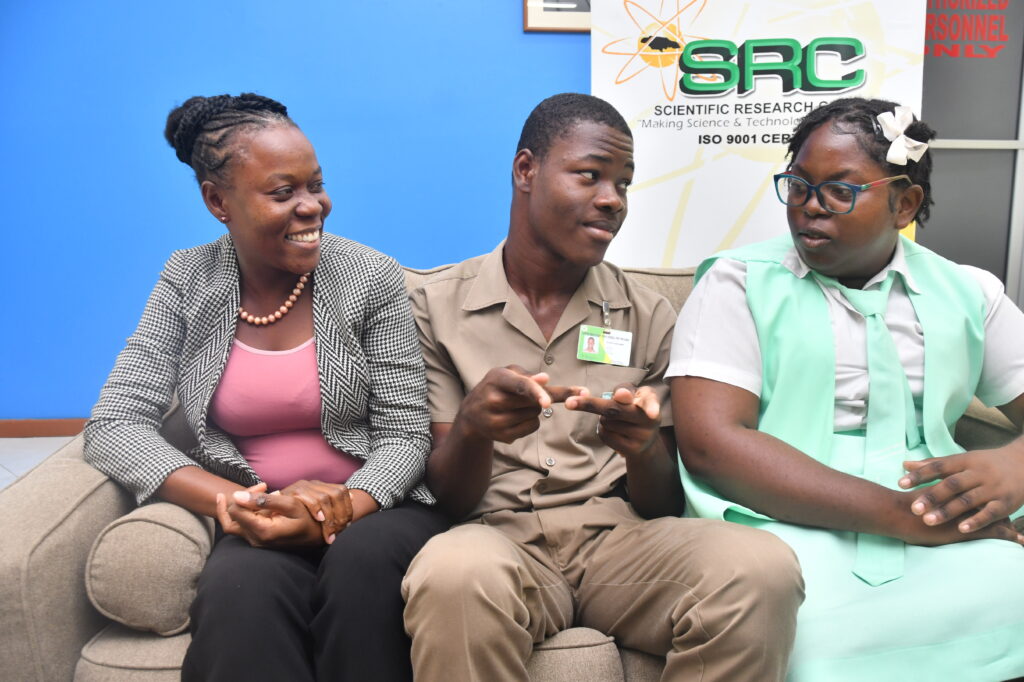(L-R) Tania Taylor, a science teacher of the Lister Mair/Gilby High School for the Deaf, Romaine Benjamin and 4-H students of the institution Romain Benjamin and Annalise Legista (Photo: Naphtali Junior)
More than 300 Jamaicans including youths, senior citizens, and inmates have benefited from hands-on training in food preservation, soap-making, and cosmetic formulation, courtesy of the Scientific Research Council (SRC) Community Development Unit.
“At the Scientific Research Council, we don’t just see science as something that happens in a lab. It’s not far-fetched. We see it as a tool that can change lives,” Dr Charah Watson, executive director of the SRC, told Observer Online.
Founded on a mission to promote science and technology for national development, Watson highlighted that the SRC has long prioritised the research, development, and application of practical technologies that directly benefit the Jamaican people.
“The Community Development Unit is essentially our outreach engine – a softer, but more powerful expression of our mandate,” Dr Watson explained. “We go where people are, and deliver hands-on, practical training in agro-processing, food safety, soap-making, cosmetic formulation and other value-added skills. We help people unlock their potential using science as a pathway.”
Dr Charah Watson, executive director of the Scientific Research Council (Photo: Naphtali Junior)
The unit was established in 2016 with this vision in mind to bring science directly to communities, schools, senior citizens, farmers and even correctional facilities.
One of the unit’s earliest outreach efforts took place in August Town, where locals who were producing bag juice and ‘suck-suck’ were trained in food safety standards, equipping them to improve the quality of their products and expand their market reach.
Another initiative was a collaboration with the 4-H Club at the St Andrew Adult Correctional Centre, where 81 inmates were trained in soap making, jam and jelly production, and food safety practices.
“These weren’t just classes. The inmates produced real products and even entered them in the Denbigh Agricultural, Industrial and Food Show,” Watson shared. “We don’t do one-touch interventions – we follow up, assess needs, and build long-term relationships. And we saw the impact immediately. They were more confident and hopeful – even looking at employers who might hire them after release,” Dr Watson said.
At the Lister Mair/Gilby High School for the Deaf, both students and parents have benefited from SRC-led workshops in soap-making and food preservation – including jam and jelly production.
Romain Benjamin, a 4-H student of Lister Mair/Gilby High School for the Deaf (Photo: Naphtali Junior)
Tania Taylor, a science teacher and STEM [Science, Technology, Engineering, and Mathematics] lead at the school, described the workshops as transformational, equipping the students with valuable skills to enter the world of work.
“Because our students are preparing for life after school, we wanted to give them real-world, practical skills. Our mission is to ensure they can transition to the workforce and live independently. And because we have a diverse student population with different needs, it was important that the training was inclusive and hands-on,” Taylor said.
She was first introduced to the SRC’s Natural Products Unit through a summer attachment, and saw an opportunity to bring those skills back to her students.
“We reached out to SRC to host a soap-making workshop, and they were incredibly supportive – they provided everything we needed. One of our students was so inspired, she came to me and said, ‘Miss, I want to work by myself,’” Taylor said.
The collaboration deepened after Taylor attended Science in the Park, where she learned about SRC’s work in preservatives. Students from the institution’s 4-H Club and the Foods Department took what they learned to competition level – winning first place for their carrot star fruit jam and carrot soap in a national event. They are now exploring ways to market their products, with SRC’s guidance.
Annalise Legista, a 4-H student of Lister Mair/Gilby High School for the Deaf (Photo: Naphtali Junior)
“Now we’re looking at taking the jams to market, and the SRC has been helping us figure out next steps. This is something that could benefit our school, our community and, most importantly, our students,” she said.
“I just want to truly thank SRC for their support and partnership. This initiative has been a tremendous success. The students are enthusiastic and engaged, and we hope the partnership continues,” she added.
Other notable community workshops executed by the SRC include the training of 60 senior citizens in bar soap production, the training of women from the Port Antonio Baptist Women’s Federation in natural juice processing and engaging St Catherine bee farmers in pineapple tissue culture training and land preparation.
Efforts are also being made by the council to revive the Devon Community Committee in Manchester that was trained in Irish potato processing.
As the SRC marks its 65th anniversary, Dr Watson is encouraging corporate Jamaica and resourceful individuals to partner with the council to assist it extend its reach to more communities.
“These interventions come at no cost. Often, we even supply the materials. So we’re asking Corporate Jamaica to support us – whether through funding, materials, technical expertise, or even offering venues for training. Resources are limited, but the impact is undeniable,” Dr Watson said.
She added: “Science can feel distant – until it helps someone make their first bottle of juice, their first bar of soap, or their first sale. Then it becomes real. That’s what we do at the SRC – we use science to unlock human potential.”










